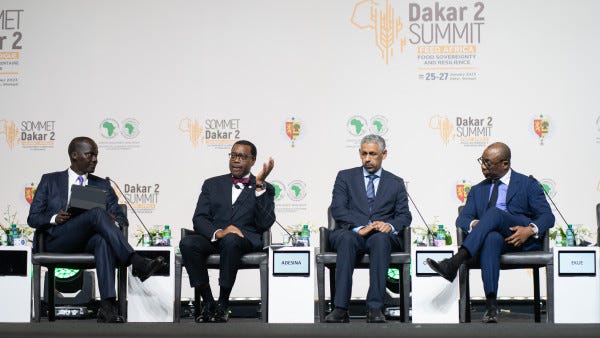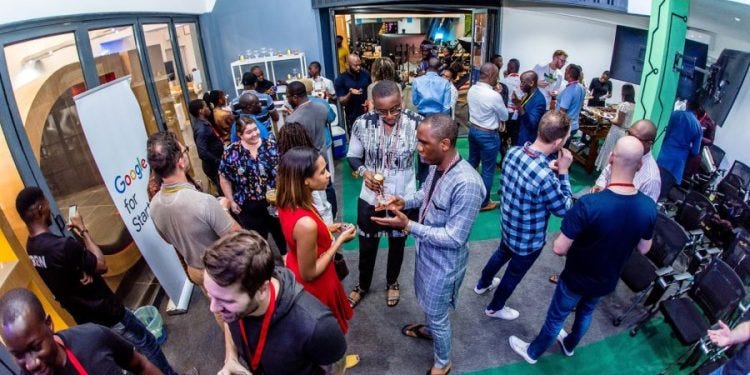This Week in Tech: No more queues; Mele Kyari assured us
You have a choice; queue for cash or queue to buy fuel. Pick the lesser devil.
Hello!
Last week, Ngozi Dozie - Co-founder at Carbon, published an article titled “Unshackling African entrepreneurs from the chains of foreign exchange & digital banking”; and I’ve had to ponder on some of the things he wrote. But, one stayed in all that he said; “I suspect that the average African will list healthcare, education, food/water as primary problems before they mention the need for a virtual card to buy goods from Asos, or foreign currency to buy Amazon stock or the latest shitcoins.” How true?
According to the World Bank; “Financial inclusion means that individuals and businesses have access to useful and affordable financial products and services that meet their needs – transactions, payments, savings, credit and insurance – delivered in a responsible and sustainable way.”
The World Bank Group considers financial inclusion a key enabler to reduce extreme poverty and boost shared prosperity.
Breaking it down. If financial inclusion means that a financial product does not guarantee any or all of this »»» “access, affordable, meet user needs, responsible and sustainable” is not doing anything about financial inclusion. It doesn’t matter how well they’ve crafted the copy to make it look interesting, hiding the real meaning of the value they deliver.
So, when you read a statement such as “25% more people installed finance apps across Africa – Joint report by AppsFlyer & Google”, you might judge things to mean the race to financial inclusion is almost done. It’s not true. Even though the report said; “app install ad spend for finance represented approximately 87% of total spend across the continent between January 2021 and September 2022.” The majority of my village people still spend cash.
With the recent shortage of naira at Nigerian banks and POS operators increased charges for withdrawals by as much as 70%. Do you think the people that are being drafted into all the financial inclusion jingoists (not properly used but you get the gist) are incentivized enough to lose a part of their money to charges every time they make a transaction? Think of it what you may.
Welcome to This Week in Tech.
We’re working to ease fuel scarcity- NNPC GMD
The Group Managing Director of NNPC Limited Mele Kyari has assured that the company is putting extreme measures in place to contain the current fuel crisis in the country. He said with the efforts so far made, there is the hope that there will be significant relief, if not the elimination of the current situation within the next one week. The Nation
Dakar 2 Summit: Partnership to deliver technologies to farmers to feed Africa – says Adesina
Africa’s push for food sovereignty and resilience depends on investments and partnerships, African Development Bank Group (www.AfDB.org) president Akinwumi Adesina said on Thursday at the Dakar 2 Food Summit a food summit in Senegal. “Today we have the technologies to feed Africa; We need to put them into the hands of the farmers. The technologies are working and we have to deliver them at scale,” Adesina told the panel, moderated by Daouda Sembene, CEO of Africatalyst, a global development advisory firm. Africa Business
Google for Startups Accelerator Africa invites tech startups for a 3-month virtual programme
Google for Startups Accelerator Africa is accepting applications from startups in 17 African countries including Nigeria. The Accelerator programme is a three-month virtual programme for high-potential Seed to Series A tech startups based in Africa. The programme is grouped into Google for Startups Accelerator (Women) Founders and Google for Startups Accelerator (Africa). Nairametrics
Investment in African gaming startups gains momentum
African gaming platforms are reporting increased investment activity, signalling investor confidence in Africa’s growing reputation as a market for the gaming industry. Between 2015 and 2021, the number of mobile gamers in Africa more than doubled from 77 million to 186 million people, according to a 2021 study commissioned by Newzoo and Carry1st, covering sub-Saharan Africa. 95% of gamers were found to play games on smartphones. Quartz
Jumia’s Shrinking Cash Balance Show That eCommerce is Still a Tough Business
Jumia wanted to be profitable by 2022. But that didn’t happen, although it cut its advertisement costs and introduced a logistics and advertising business. Jumia described its current state as “profitable after fulfilment,” implying that it now makes money on every delivery. However, that profit doesn’t reflect in its balance, thanks to high operational costs. So how has Jumia managed to stay in business despite bleeding away millions of dollars each quarter? The answer is liquidity. Jumia has always had wads of cash at its disposal enabling it to keep the business running. Ventures Africa
South African digital lender Lulalend to launch banking product off the back of $35M Series B
In most African countries, access to credit remains limited for many small businesses, with the reasons ranging from the inability to pay collateral and lack of credit history to unfavourable lending criteria and high-interest rates. In South Africa, where the annual SME credit gap is about $20 billion, according to the International Finance Corporation, fintech such as Lulalend are pulling their weight by providing varied loans to underserved small and medium-sized businesses. To carry on with its effort, the digital lender, launched in 2014, has raised $35 million in a Series B round. Tech Crunch
AI Trends to Watch in Africa With John Kamara
John is by heart a Tech Entrepreneur with over 20 successful years of experience working in new market acquisitions across various technology verticals in Europe, America, Asia and Africa. John is one of Africa’s leading experts on how businesses can leverage key technology trends, instantly transform organizations and drive competitive advantage for impact in industries including finance, agriculture, health, education, gaming and startup enterprises. Irish Tech News
You might be unable to apply for the UK's Tech Nation Visa after March 31, 2023
The shutdown of Tech Nation puts the UK in a negative light when it comes to encouraging innovation, especially after the government recently cut back on the R&D tax credit scheme for startups. The shutdown of Tech Nation will likely have a significant impact on the UK's tech industry and its ability to attract talent from abroad. TechPoint
About This Week in Tech.
Every Thursday, at 10am, you will get a quick-to-read brief of what has happened in tech in the last 7 days.
Cheers!
This Week in Tech
For Adverts, send us an email - at giantaffairs@gmail.com OR call - 08074727030 | See Africa Tech Memo Ad Rate





